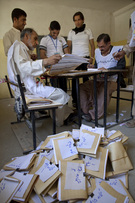 The latest results from Afghanistan’s presidential election are showing that the incumbent President Hamid Karzai has garnered 54.1 percent of the vote after 92 percent of polling stations declared. Crucially, this puts him above the 50 percent threshold needed to avoid a run-off with rival Abdullah Abdullah.
The latest results from Afghanistan’s presidential election are showing that the incumbent President Hamid Karzai has garnered 54.1 percent of the vote after 92 percent of polling stations declared. Crucially, this puts him above the 50 percent threshold needed to avoid a run-off with rival Abdullah Abdullah.
But the result has been greeted with derision by observers, while the Election Complaints Commission (ECC) has said a recount and inspection should be done for any polling station where 600 or more votes were cast, or where any single candidate got more than 95% of votes.
So what happens next? First of all, expect a fight to develop between the Independent Election Commission and the Election Complaints Commission. Though the latter has the power to annul the election, this would be a very contentious move, and would directly pit the locally-run IEC against the internationally-manned ECC. It is not clear that its leader, Canadian Grant Kippen, will have the courage to dismiss any of the top candidates, even if widespread fraud is proven.
This is not to disparage the ECC. With experts and voters in the US and Europe turning against the NATO-led mission, will Western leaders have the courage to take such a bold move? Will President Obama want to be seen to decide the outcome of the election? I suspect that the international community will bite the bullet and accept that a flawed election is the best of a range of bad options.
The most likely scenario is therefore that President Karzai wins and the international community tries to cobble together a coalition with his main rival. Karzai reached out to Abdullah before election, so it is not impossible that he could be persuaded to do so again, whatever he is telling the press now. Such a Kenya-style coalition would also go with the grain of the kind of big-tent politics often practiced in Kabul – even if it would make efficient government even less likely.
This means it will all come down to Abdullah and how he reacts. He can chose to be part of a Government he left in disgust; give shape to the Loyal Opposition, which is quite fragmented; or form a Disloyal Opposition i.e. an extra-constitutional, either violent or non-violent, resistance to Karzai’s rule. For the latter, think the lawyer’s opposition to General Musharraf’s rule in Pakistan.
Here, again, a lot will depend on the international community’s attitude. If the US offers support for Abdullah shape a loyal opposition, and promises to back Abdullah after Karzai finishes his term – perhaps even promising to push constitutional changes that would limit Karzai’s options and introduce a party-based electoral system – then a deal could be struck.
None of this is particularly satisfying for the West or the millions of ordinary Afghans who braved the Taliban and voted. But it looks like the most likely scenario.






Comments